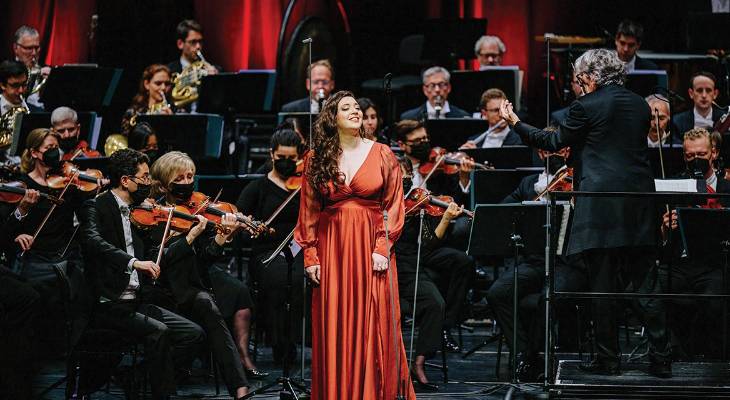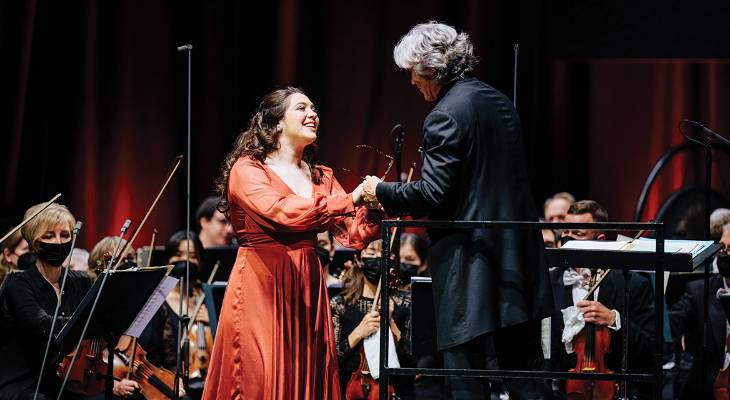Meet Marvic Monreal: The first Maltese mezzo soprano to debut at London’s Royal Opera House
“I feel like I always knew this would be my calling,” 31-year-old Marvic Monreal says, about her passion and purpose – singing. When we speak, the young soprano, who has been earning plaudits for her deep mezzo voice, is about to jet off to Austria for a couple of days. She also headed to London, where from the 11th to the 29th of September she debuted at the Royal Opera House in a new production of Wagner’s epic opera, ‘The Ring Cycle’ – the first Maltese mezzo-soprano to appear on that stage.
“As a kid, I had no idea that I would actually become a professional opera singer. I also didn’t realise it would take almost 10 years of hard work to start breaking through but, at the same time, I’ve always felt that this is me, this is who I am,” she smiles. Marvic has a joyous aura about her, one which belies the pure grit she’s had to nurture to assert her presence on the stages of international theatres, in front of discerning opera audiences.

Carlton Agius
“You’re given a talent; what you do with it is another thing. It takes a lot of technique and practice to start to build on that talent, so you cannot just know how to sing. You need to be on it – networking, travelling, learning. It’s a 24-hour-a-day job,” she explains.
And, indeed, Marvic’s journey has been characterised by guts, perseverance and fortitude. “I started singing in choirs at my local church in Żabbar, and I was also chosen to participate in the choir performing for Pope John Paul II when he visited Malta in 2001,” she recalls. The first time, however, Marvic stepped on the stage was when she took on a role in a summer musical organised by producer, writer and director, Marco Calleja. This was a formative experience, she says, one which inspired her to become further involved and, in sixth form, she sang with the Junior College Orchestra, travelling to Germany and Italy for performances.
“I was 15 or 16 when I realised I could sing classical music,” she smiles, explaining that this understanding convinced her to take lessons with soprano Gillian Zammit. “That’s when I truly started to sing seriously. I participated in MiniGig, organised by Rosetta Debattista and Denise Mulholland, singing in different villages and squares. It was really good fun, the audience loved it, and the children were amazed,” she remembers fondly.
Alongside her artistic endeavours, Marvic also invested her energies in building a more traditional career, studying for a degree in Tourism Studies, and, working with the national airline, Air Malta. “I worked with the airline for around four years, studying part-time and singing on the side. I then had my Malta Philharmonic Orchestra debut with Maestro Michael Laus, following which Gillian told me that, if I truly wanted to take this seriously, then I would have to leave Malta,” she says.

Besim Mazhiqi
Some might not have heeded that call, but Marvic decided to take on the challenge. “I auditioned for London colleges and I applied for an undergraduate degree. During the callback from the Royal Academy of Music, they said my voice was mature enough and immediately offered me a place on their Master’s degree course,” she continues. Marvic studied at the notable London institution for four years, completing her postgraduate degree whilst also following a two-year course on opera. She went on to complete a ‘bridge course,’ designed to introduce students to the real, working opera world, auditioning at the Royal Opera House in Covent Garden – her first connection with the theatre, with which she would develop a working relationship – as well as for all the major music companies and festivals in the UK.
“Following this one-year bridge course, I was hired to cover for the role of Charlotte from ‘Werther’, as well as the role of Mercedes from ‘Carmen’ at the Royal Opera House in London,” she says. Moreover, to boost her work experience, she joined a young artist programme, regularly organised by European opera houses across the continent. “You would work and be coached at the same time, but these programmes are extremely competitive, and I’d always get to the final round, and lose out to the competition. I didn’t have an agent, and I was spending a lot of money putting in these applications and going to the auditions. After two years of trying to secure a place, I decided I would stop auditioning and did not apply for anything except for a competition called New Voices, based in Germany. It’s very prestigious; they take auditions from candidates from all over the world, and I got into the final 40. I didn’t even make it to the semi-finals, and I felt very disappointed.”
However, as part of that process, candidates are promised feedback. “The first person I sat with was the general director of the Frankfurt Opera House, who told me he had voted for me to get to the final, and he’d love it if I could come to Frankfurt and attend their programme. I couldn’t believe it – Frankfurt is one of the best opera houses in the world at the moment, and, after doing my homework, I accepted his offer, living in the city for two years,” she smiles.
It wasn’t an easy time, she asserts, pushing her to challenge herself in unexpected ways. “After my experience in London, the German system felt like a bit of a factory; it was tough, but I grew a lot and it helped set the foundations for my freelance career, which is where I’m at now, after nine years of studying and trying to establish myself.” This length of time was necessary, she insists, for her to develop the inner resources she needs to continue to build on these solid grounds. “If you manage before you’re ready, what’s the point,” she states. Growth, after all, cannot be built on sand.

Besim Mazhiqi
What keeps her going, I ask? “I have so much support, so many people pushing me, so stopping was never an option. I just have to keep going and keep smiling. So, whenever I have a bad audition or I feel bad because I don’t get a particular job, I give myself two days to be sad but, on the third day, I have to move on. You just cannot take things personally.”
Marvic also credits her success to her positive approach. “You’ve got to keep looking forward, keep moving and meeting new people. This is such a small world, and you may have to do jobs which are not worth it, but, perhaps, you may work with an assistant director who, years down the line, will have progressed to more substantial roles and will want to work with you. However small your progress, you cannot remain stuck in one place. Being good is not good enough. It’s very competitive out there so you have to have a focused drive.”
The mezzo-soprano admits this may not be for everyone, since it comes with many personal sacrifices. She admits that leaving the island was essential, in her case. “In Malta, you can try and be the best of what you can be but, unfortunately, to really become a professional, you definitely have to leave since there are not enough opportunities – in terms of jobs, workshops and contacts,” she says.
Despite this, she credits her home for giving her the necessary resources to build her singing career. “I had help; I had received a Malta Arts Scholarship and the BOV Joseph Calleja Foundation also assisted me, so I was lucky. Joseph [Calleja] himself also championed my career. Of course, we still lack a professional school, and there’s no opera house on the island of Malta, so we’re still lacking in some senses, but if someone wants to truly do this, they now have access,” she asserts.
The islands still remain core to her identity. “Home is always home; I’m passionate about our language, and I know that, when I’m abroad and say I’m from Malta, many are very excited to get to know me. I miss the sea – it’s a luxury – and I miss the food, my family and friends, as well as the flexibility to do what I want when I want, such as starting the day with a swim, heading back home to do some admin work and then shopping. Abroad, you don’t have the opportunity to pack as many diverse things in a day,” she laughs.
Indeed, when she lands back home, she savours the downtime, going for long swims and walks. “I like to relax at home, visit friends, and spend a day in Gozo. If I’m singing, and it’s summer, I cannot stay out in the sun too much since my voice gets very dry, but there’s always something to do or someone to catch up with,” she says.
Looking ahead, and after her debut as Erste Norn from Götterdämmerung at the Tiroler Festpiele Erl in Austria, Marvic heads to London for her Covent Garden performance as Flosshilde in Wagner’s ‘The Ring Cycle’. She then departs for Berlin where, between 12th and 14th October, she will be singing in ‘Stabat Mater’ by Dvořák with the Berliner Philharmoniker.
She’s always nervous before such big performances, she confesses, but she usually “ups her game” when she sets foot on the stage. “I’m learning to love the whole process better – the rehearsals, studying the music, learning to go off a copy – but it all takes a long time and sometimes I need to focus to find patience,” she smiles.
From the sounds of things, however, Marvic is off to a flying start.